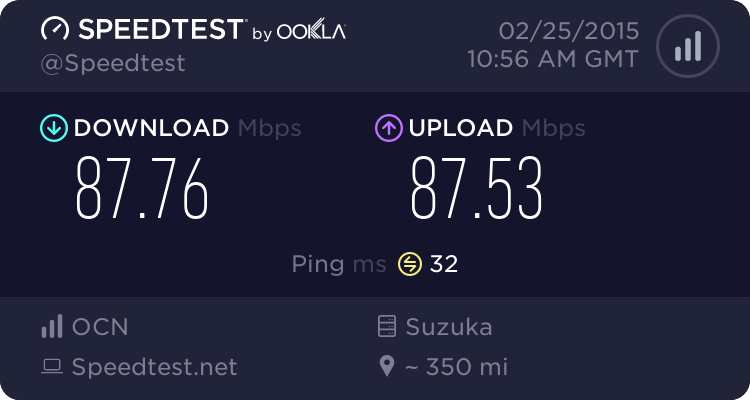Connectivity in Japan
I have been to quite a few countries but I must say Japan just stands out in internet connectivity. Overall connectivity is just amazing out here. As I landed on airport in Fukuoka, I noticed open free wifi (just one signup online form to accept TOS and it was up), later I noticed Fukuoka City Wifi project and it’s really visible across streets and very much works. As
I got to hotel, I was given SSID for wifi and it was just up! No crazy proxy, no crazy use of hotel room numbers/last name combinations. I was getting 20Mbps speed on wifi. This was a clear sign that transit was not bottleneck and likely wifi/end point connectivity was the one which was putting it on to 20Mbps (802.11n on a good quality router with 5Ghz). As I connected my laptop on wired LAN, I noticed (which I did expected by now) - connection synced at 100Mbps LAN and that was pretty much internet speed I was getting.

This is really amazing experience w.r.t to connectivity, and I must say far better than that of Western world (US/Europe). Internet here is covered within hotel’s price, unlimited, with no crappy proxy, available on wired LAN as well as wifi and even with 5Ghz band for really fast wifi. I would rate Japan as fastest country where I got this kind of fast connection even in Hotel. On second I would rate Dubai where I had 25Mbps pipe (with crazy restrictions on VoIP). Interesting both Japan and UAE don’t have much of competition in sector and very much controlled by one or two market leaders. E.g in Japan it’s either Softbank or NTT DOCOMO, while in UAE it was Etisalat and du. This really confuses me on whether competition is good or bad? How much role lack of competition in broadband market in India plays w.r.t. quality of service, price and speeds at which services are offered.
This is one side of things in this part of world while on other end back in my home country India, we see a mad rush for fiber connectivity and free wifi. For fiber connectivity it’s about connecting Gram Panchayats (which is of no meaning with no clear vision) and free wifi from players like BSNL and that too for like free 30mins with OTP based authentication. Must say it’s less of “Indian problem” and more of a problem which comes when “not-so-cool bureaucrats” design policies, and push technical folks behind. Look at the state of leaders in ISP industry in India - mostly it’s non-technical, it’s super common to find engineering communities from Nepal, Bangladesh and Sri Lanka but not from India.
Some of key examples of “not-so-smart” decision making from our bureaucrats in ISP world
- Lack of peering ecosystem in India
- The requirement of ISP license
- Requirement to authenticate each and every wifi user and to run wifi in closed manner with crappy OTP
- Fact that country has almost no IPv4 left and IPv6 is not deployed at all. We left that task on IITians, remember? :P (On serious note IIT Kanpur did a good real world deployment on IPv6 as described here).
- Fact that industry lobby is so hard that it’s able to push Govt. to even put a consultation paper on OTP providers rather than accepting them as new age technologies.
- The fact that Indian Govt controls BSNL, MTNL, PowerGrid Corp, RailTel, STPI, NIC, ERNET, etc and still country lag behind pretty badly in almost all domains and regions wherever these bodies operate.
Time to find some dinner. Afterall it’s Japan and little tough for vegans like me! :)